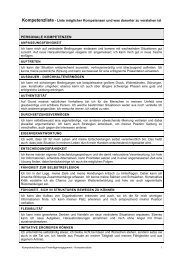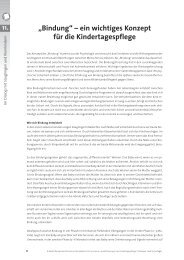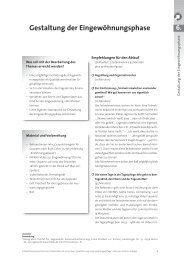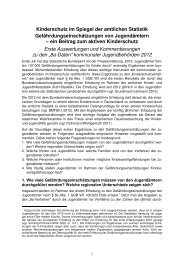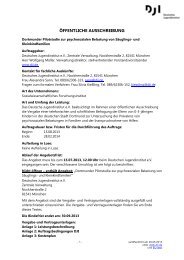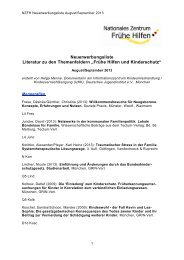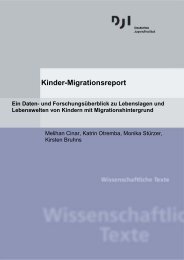download - Deutsches Jugendinstitut e.V.
download - Deutsches Jugendinstitut e.V.
download - Deutsches Jugendinstitut e.V.
You also want an ePaper? Increase the reach of your titles
YUMPU automatically turns print PDFs into web optimized ePapers that Google loves.
projects for young people. The LOS programme aimed to improve the social and<br />
professional integration of particularly disadvantaged persons is an ideal supplement to the<br />
aforementioned programmes and plays a part in the upward revaluation of social<br />
environments.<br />
Each of the programmes described has its individual targets and orientation, but all are<br />
linked by their socio-environmental perspective which can be summed up by the following<br />
basic principles:<br />
• Social spaces must be locally established and documented from the aspect of<br />
planning.<br />
• A cooperation between the various public authorities must be created and also<br />
• the activation and direct participation of local inhabitants.<br />
• A local management must be created for the supervision of activities.<br />
The LOS compiled the following programme requirements on the basis of these guiding<br />
principles:<br />
• creation of local plan of action<br />
• functioning of public authority network<br />
• creation of a local coordination office by local or regional authorities<br />
• participation of local network<br />
• creation of accompanying committee including actors from the development<br />
area<br />
• involvement of local inhabitants<br />
The core of LOS is the support for local plans of action. The local bodies selected in a<br />
concept competition receive funds up to a maximum amount of 100.000 € per<br />
development area and funding period (one year) for the creation and/or continuation and<br />
implementation of a local action plan. The local body can allocate financial support from<br />
this development fund for concrete micro-projects for the implementation of the action<br />
plan. Unlike other ESF programmes, the micro-projects organised by LOS are not directly<br />
funded through the intermediary authority, but through the recipients of the development<br />
funds for the local action plans.<br />
What are local action plans? These constitute a local political instrument aimed at the<br />
intensification and stabilisation of local networks between citizens, politics, administration,<br />
local businesses, free associations and educational institutions, etc.<br />
What are the contents of a typical LOS action plan? The plan includes information on<br />
the area to be developed (e.g. structural data such as levels of unemployment, recipients of<br />
social benefit and percentage of foreign citizens), a situation analysis of the relevant area,<br />
the compilation of development targets and a suitably coordinated concept of action<br />
containing ideas for projects. Additionally, statements must be formulated on the subject of<br />
individual cooperation forms and networks.<br />
The implementation of LOS in the development area is performed by a variety of<br />
already mentioned actors and bodies:<br />
Crucial for LOS is a network of all relevant public authorities, primarily the departments<br />
for youth welfare, economic development and/or urban development and job agencies.<br />
Additional authorities can be incorporated according to the relevant problem situation.<br />
70





